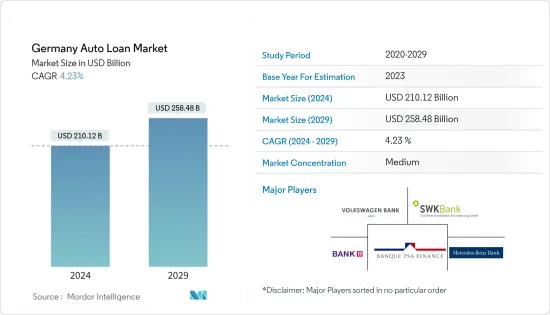PUBLISHER: Mordor Intelligence | PRODUCT CODE: 1521463

PUBLISHER: Mordor Intelligence | PRODUCT CODE: 1521463
Germany Auto Loan - Market Share Analysis, Industry Trends & Statistics, Growth Forecasts (2024 - 2029)
The Germany Auto Loan Market size is estimated at USD 210.12 billion in 2024, and is expected to reach USD 258.48 billion by 2029, growing at a CAGR of 4.23% during the forecast period (2024-2029).

Germany is recognized the world over for its outstanding automotive industry and excellence in engineering. A popular financing option in Germany is the "Ballonfinanzierung," which involves lower monthly payments with a larger final payment (balloon payment) at the end of the term. Leasing is a common alternative to purchasing in Germany. Both individuals and businesses often opt for leasing arrangements, providing flexibility and potential tax benefits. Germany's strong economic stability contributes to a robust automobile finance market, with consumers having the confidence and means to finance vehicle purchases.
The industry has embraced digitalization, and many lenders offer online platforms for convenient loan applications, approvals, and management. The presence of renowned automotive manufacturers in Germany contributes to a thriving automobile finance sector. Affiliation with these brands may influence financing options.
Germany's robust economic stability contributes to a strong auto loan market. Government incentives, particularly for electric vehicles, can impact consumer choices and influence financing options. Incentives may include tax benefits and subsidies. Traditional banks, credit unions, and specialized auto finance companies contribute to a diverse landscape of lenders offering auto loans. Interest rates on auto loans in Germany are competitive and influenced by factors such as the borrower's creditworthiness, loan terms, and prevailing economic conditions.
Germany Auto Loan Market Trends
New Vehicles Sales are the Major Revenue Generating Segment in Germany
The new vehicle sales segment plays a significant role in generating revenue and influencing the German auto loan market. New vehicle sales contribute directly to the volume and value of auto loans. As consumers purchase new cars, they often seek financing options, leading to increased loan volumes for lenders in the auto finance market. New vehicle loans often come with higher principal amounts compared to used vehicles, impacting lender profitability. The interest income generated from financing new car purchases contributes to the overall revenue for auto loan providers. The demand for new vehicles can influence interest rates and loan terms in the auto loan market. Lenders may adjust interest rates based on factors such as market demand, economic conditions, and the perceived risk associated with financing new cars.
Increasing Registrations of Electric Vehicle in Germany
As more consumers opt for electric vehicles, there may be a shift in demand for auto loans. Consumers may seek financing options specifically tailored to electric cars, considering factors such as the higher upfront cost and potential incentives for electric vehicle purchases. Governments and financial institutions may introduce specific financing incentives or programs to encourage the adoption of electric vehicles. This could include lower interest rates, extended loan terms, or other favorable financing conditions for EV buyers. Consumers may become more aware of the total cost of ownership, considering factors beyond the initial purchase price. Auto loans are influenced by the cost savings associated with electric vehicles, such as lower fuel and maintenance costs.
Germany Auto Loan Industry Overview
The market for German car loans is relatively fragmented. The key players are emerging to improve their products and delivery through the different loan options and enhancing their products to have a competitive edge over others. Competitiveness in interest rates is a key aspect of the landscape. Lenders strive to offer attractive rates to attract borrowers and gain a competitive edge. The quality of customer service and overall customer experience, including transparency in loan terms, play a crucial role in differentiating lenders in this competitive market. Hence, this section is inclusive of the company profiles of the key players and industry analysis. Auto Loan across Germany is offered by groups such as Volkswagen Bank GmbH, Mercedes-Benz Bank AG, Banque PSA Finance S.A., Bank11 fur Privatkunden und Handel GmbH, Sud-West-Kreditbank Finanzierung GmbH, etc.
Additional Benefits:
- The market estimate (ME) sheet in Excel format
- 3 months of analyst support
TABLE OF CONTENTS
1 INTRODUCTION
- 1.1 Study Assumptions and Market Definition
- 1.2 Scope of the Study
2 RESEARCH METHODOLOGY
3 EXECUTIVE SUMMARY
4 MARKET DYNAMICS AND INSIGHTS
- 4.1 Market Overview
- 4.2 Market Drivers
- 4.2.1 Leading Share of Passenger Vehicle Sales
- 4.2.2 Quick Processing of Loan through Digital Banking
- 4.3 Market Restraints
- 4.3.1 Rising Interest Rates Affecting New Auto Buyers Demand for Loan
- 4.4 Market Opportunities
- 4.4.1 Emerging Market of Electric Vehicles Expanding the Auto Loan Market
- 4.5 Industry Attractiveness - Porter's Five Forces Analysis
- 4.5.1 Bargaining Power of Suppliers
- 4.5.2 Bargaining Power of Buyers
- 4.5.3 Threat of New Entrants
- 4.5.4 Threat of Substitutes
- 4.5.5 Intensity of Competitive Rivalry
- 4.6 Insights on Consumer Behavior Analysis
- 4.7 Insight on Various Government Regulations in the Market
- 4.8 Insights on Technological Innovations in Auto Loan Market
- 4.9 Impact of COVID-19 on the Market
5 MARKET SEGMENTATION
- 5.1 By Vehicle Type
- 5.1.1 Passenger Vehicle
- 5.1.2 Commercial Vehicle
- 5.2 By Ownership
- 5.2.1 New Vehicles
- 5.2.2 Used Vehicles
- 5.3 By Provider Type
- 5.3.1 Banks
- 5.3.2 Non Banking Financials Companies
- 5.3.3 Original Equiptment Manufacturers
- 5.3.4 Credit Unions
- 5.3.5 Other Provider Types
- 5.4 By Tenure
- 5.4.1 Less than Three Years
- 5.4.2 3-5 Years
- 5.4.3 More Than 5 Years
6 COMPETITIVE LANDSCAPE
- 6.1 Market Concentration Overview
- 6.2 Company Profile
- 6.2.1 Volkswagen Bank GmbH
- 6.2.2 Mercedes-Benz Bank AG
- 6.2.3 Banque PSA Finance S.A.
- 6.2.4 Bank11 fur Privatkunden und Handel GmbH
- 6.2.5 Sud-West-Kreditbank Finanzierung GmbH
- 6.2.6 Deutsche Bank AG
- 6.2.7 Nordfinanz GmbH
- 6.2.8 Auto Empire Trading GmbH
- 6.2.9 Smava GmbH
- 6.2.10 Santander Consumer Bank AG *
7 MARKET FUTURE TRENDS
8 DISCLAIMER AND ABOUT US




